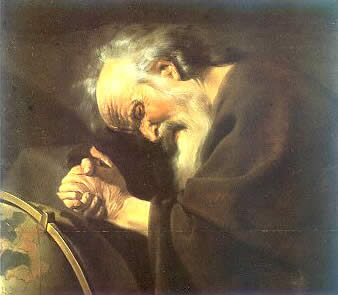This is a continuation of our reflections on character as destiny.
We left this discussion having stripped down the self to nothing but her choices, but that was not where I wished to leave her. I would sooner clothe her in all the particulars of the universe than leave her a naked abstraction.

Charles H. Kahn breaks down Heraclitus’ epigram ethos anthropoi daimon as follows:
‘character, for man [is his] daimon’. The meaning of the sentence depends on the meaning given to daimon.
As discussed before, we could read this as it has often been read, as the pronouncement of an inspirational speaker: yes, you are the master of your own destiny!, or a Kahn puts it, the cause is not in the stars but in ourselves. That may be how Heraclitus meant it, but as I have argued previously, it sounds a little out of character (pardon the pun) for a man whose mantra appears to have been all things are one.
Kahn suggests two basic definitions for daimon:
- one’s destiny, fortune; one’s prosperity or misfortune
- a god, divinity, or angel; one who distributes or assigns a portion
I believe both of these definitions are equally appropriate, and I’m not terribly concerned with drawing a distinction between them. My concern is whether Heraclitus intended to suggest that character is the lone causative agent by some causational unfolding of one’s personal destiny, or rather, whether Heraclitus may have meant that character, as is said of virtue, is a destiny—a fortune—unto itself.
Though Kahn does not address this issue directly as it pertains to this specific epigram, he does discuss it in relation to another aphorism.
But if everything that goes up must come down again, since there is no transmundane realm, no escape from the cosmic cycle …, one might question the coherence of this conception of the soul’s path upwards to celestial light or fire as a ‘greater destiny’ … where is there any ultimate difference of principle between the nobler and the baser fate, where in the long run is there any advantage allotted to wiser lives or better deaths?
Here we see Kahn confronting Heraclitus, and demanding consistency of him. If we do so, we must suspect that daimon must mean something other than one’s ultimate condition at the moment of death (or ascension).
Kahn continues …
This is the specifically Heraclitean form of a general question that any monistic system of ethics must face. And Heraclitus would surely have answered like Spinoza: the beatitude which rewards a life of excellence is the quality of that life itself; in his own words ‘man’s character is his fate’, his daimon for good fortune or for bad.
Hence, we might reword the phrase a touch:
Character, for man, is his fortune. —Heraclitus
… and we might be reminded of something that was said 500 years later:
Virtue is its own reward —Ovid
I think I prefer the non-compensatory language of Heraclitus, ambiguous as it is.